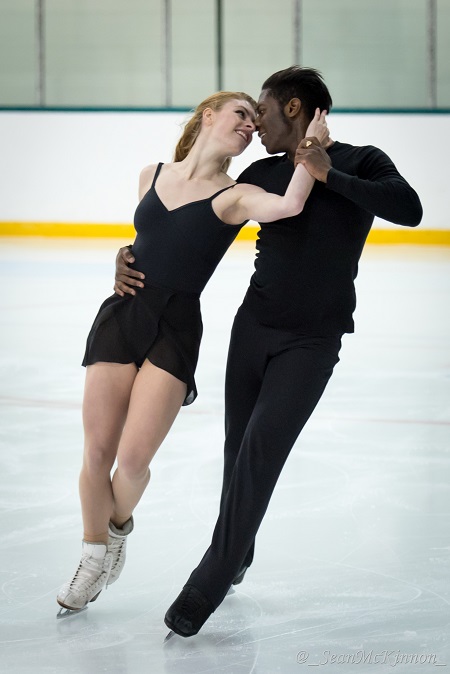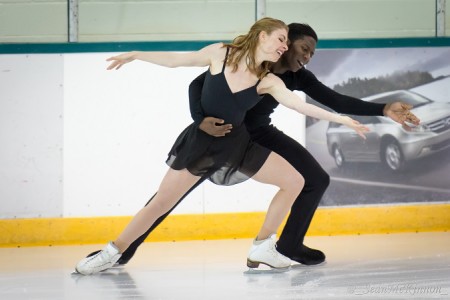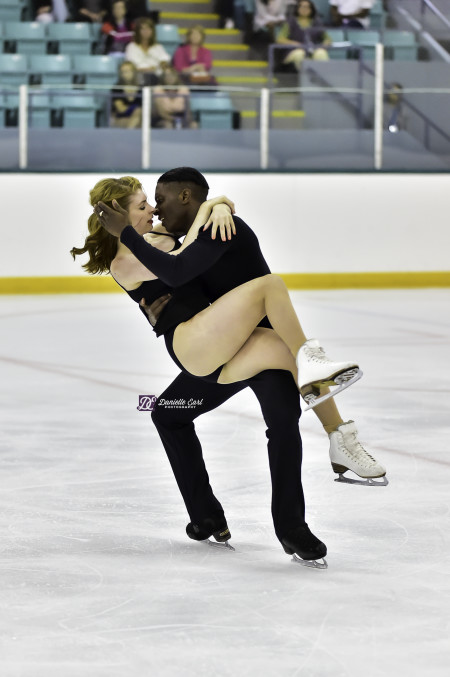by Jacquelyn Thayer
A planned West Coast vacation for Canadian ice dancer Asher Hill — journeying from Vegas to L.A. up through Vancouver to meet with skating friends — prompted an unexpected invitation from British Columbia-based Nicole Orford, recently split from a five-year partnership with Thomas Williams.

Orford and Hill perform their short dance at Scarboro’s “So You Think You Can Judge” show. Photo by Sean McKinnon.
“Nicole was like, ‘Oh, since you have your skates, wanna just try out for fun?’ said Hill, who had spent a season off the ice following partner Kharis Ralph’s retirement. “And I brought them with me and during my vacation we tried out, and it went really well — first day, everything started clicking really well, better than we expected and better than most of the coaches, I think, expected, too.”
“When I talked to [coaches Megan Wing and Aaron Lowe] they said, we knew that Asher was looking for a partner, but I don’t know if he fits, if your skating styles will match,” said Orford. “We just both have really different skating styles, or with our previous partnerships we had a really different style.”
But the April tryout succeeded beyond expectations — a surprise for two skaters who had prepared to hang it up. Hill spent the preceding year off, taking on a couple of unsuccessful tryouts earlier this spring. “I knew if I didn’t have a partner for this year, I would definitely consider quitting for sure,” he said.
Orford knew the current partner market was limited and made her own plans for a new path, registering for her first-ever full-time course load at Simon Fraser University in spring and summer. “I started coaching more full-time at my club, the Inlet Skating Club, and I actually took on the position of CanSkate coordinator in January. And then I planned a trip to Greece in May, so I went to Greece for three weeks this May,” she said. “I just really didn’t think I was skating any more, and I was okay with that. I kind of had to be.”
The tryout introduced a few wrinkles into her plans. “Then it was kind of like ‘Oh geez, I’m leaving for Greece for three weeks, what do we do?'” she said with a laugh. “So we didn’t really decide anything until basically June, when I got home from Greece. I got home and two days later I booked a flight to Toronto and that was it.”
Next for the couple, training full-time at the Scarboro Figure Skating Club under Hill’s long-time coaching team of Carol and Jon Lane and Juris Razgulajevs, was the immediate catch-up process: setting programs. The Scarboro crew would handle the short dance, while Orford’s former coaches Wing and Lowe would create their free. The joint effort gave both partners a glimpse of what Hill termed two “very different” approaches.
“Carol and Juris have ideas and it’s up to us to figure out what works best — that’s kind of how I felt,” said Orford. “And with Megan and Aaron, they figure out steps and then we do what they tell us to do. They obviously expect our input and ideas that we have, but it’s a little bit more like… They skate it and do it and everything looks great when they do it, and then we try and do it and it doesn’t look as good,” she concluded with a laugh.
All were focused on creating a fairly straightforward set of programs, material comfortable for a new team while also unlikely to alienate panels. A smooth, jazzy route for the short dance, featuring Etta James and Johnny Mathis, was a choice easily made, but the free dance came with far more effort. With no music selection in hand, the two made a two-week trip to Vancouver at Wing and Lowe’s availability — in part to accommodate Orford’s on-site exam schedule, in part to maximize time to settle on a program direction.
“They had given us a bunch of ideas to choose from and try to sift through, but a lot of the stuff we didn’t really like — it didn’t really stick,” said Hill. “So then they gave us some movie soundtracks, and I started listening to stuff on YouTube, just playing things in the background, trying to listen to stuff on Spotify, my phone. And then an album came up from The Theory of Everything, and it started playing, and it was really nice music but I wasn’t paying attention to it, I was just letting it play in the background.”
After another unsuccessful meeting to pin down a music selection, Hill mentioned the film score to the others. “So we started listening to the pieces, and all the pieces were just beautiful — well-orchestrated, strong, had good skateability,” he said. “And we just started picking little pieces that we liked and tried to thread them together to make a program. So it was really by accident.”
After exhibiting both programs at Scarboro’s So You Think You Can Judge show in early August, the two made their competitive debut a week later at Central Ontario Summer Skate, or Thornhill, finishing second in the short dance and first in the free — a segment for which they registered at the last minute.
“[The free dance] was maybe two or three weeks old — what we did at Thornhill was maybe the fifth full run-through, and probably the first time that everything actually worked,” said Orford. “We figured why not?”
They entered with no certainties regarding reception and no expectations for scores or placement, putting focus on their own work. “We didn’t know what to expect from each other, either, like how we both bear under competition pressure and everything,” said Orford. “Even in practice and at the competition, we were saying to each other ‘Just be patient, have fun and be safe.’ We need to be patient because I think both of us have a tendency to kind of rush when we get stressed from pressure and because we’re trying to really go for it, we’re working against each other rather than just taking our time and moving together. Then having fun is important, and then safety because we’re still new and we don’t want to throw ourselves into things.”
“It was a really nice stepping stone, to get out there, especially for me, because I’ve had the year off and I didn’t know how I would react under pressure,” added Hill. “At Thornhill I wasn’t crazy nervous, but it was the little anxiety of having been done for the year, like am I going to all of a sudden stop breathing at one point in the program, like my body doesn’t know what a competition is any more? But it was a nice boost of confidence to be able to do two pretty clean programs at our first outing within two months of our partnership.”
Orford notes that while both partners are perfectionists, Hill’s prior longstanding partnership with Ralph has meant an additional level of adjustment in a new pairing.
“The last time he skated with a new partner was 14 years ago,” said Orford. “For me, I started ice dance a little bit more recently and had two partners already, so I kind of know the process. So even though I like things to work right away, I think for us I feel a lot of the times I’m reminding him ‘It’s okay, we’re new, don’t worry, it’s not going to work right away.’ It’s okay if we have a bad day, not every day is going to be great.”

Orford and Hill perform their free dance at Scarboro’s “So You Think Can Judge” show. Photo by Sean McKinnon.
“Especially the first month-and-a-half, it took me awhile to just keep reminding myself not everything is going to be perfect,” said Hill. “It’s just that feeling that I want it now, but I have to let the process happen, and just let everything come in time. And it has been — it’s clicking really fast, and it’s been a fun process, too. I think we’re really having fun with each other and that’s really helping the process along.”
He sees, too, an advantage in a new start. “One thing that I enjoy in skating with Nicole is that she really just ‘goes,’ and before, I was always the person that was like ‘Just go!’ and Kharis had to keep up with me,” he said. “But now I find that I have to keep up with Nicole and it’s challenging my skating in a new way. I thought, coming back, that maybe I’ll be a little bit more stale — I’ve taken a year off, my skating may not be as good. But I find that skating with her has really pushed me to get back to that level of skating that I was at more quickly, and that’s what I’m really enjoying.”
And as with the pairing or the free dance, the fortuitous nature of things so far has extended to the finer points.
“It’s really surprising how well leg lines and stuff match in such a short time, just kind of naturally — it was nothing that we really worked on, it just happened,” said Orford. “Kind of everything has been like that so far.”
“It’s not that we weren’t working on it, it was just that we have to focus on so many things that when we watch ourselves, it’s like ‘Oh, that’s surprising that it already matches.’” added Hill. “Because we’ve been spending a lot of time on the macro and we’re just starting to get into the little details in our skating.”
The partnership, of course, has meant adjustments to life beyond competition for both skaters. Orford, six courses away from completing her undergraduate studies, has been able to enroll in online coursework, taking on three classes for the fall and, she hopes, a final three in the spring. Having loved ones nearby has further eased Orford’s Ontario transition. “My sister also goes to school here, so we’ll be living together, so that’s nice — I have family,” she said. “I also have aunts and my grandparents live out here, so that helps.”
Hill, continuing studies at Ryerson University, has spent much of his time since last season getting a fresh angle on the sport as coach and choreographer — in grand fashion.
“My first competition as a coach was [Skate Canada] Challenge, which was a pretty big stepping stone for a coach,” he said. “I found out I don’t like competitions as a coach — you’re just watching like, if the kid’s good, you’re happy, but if the kid’s doing disastrous, you’re like ‘Why?’ It’s really a different kind of nervous — completely different perspective on competitions and you have no control of what your skater’s doing out there.”
Choreography for dancers and singles at the younger levels, meanwhile, provides some creative incentive. “It’s nice to work with really good skaters, but I like the challenge of working with kids who are really stiff,” he said. “It’s fun to work with them and try to mold them into what you want.”
Hill’s choreographic adventures began in dramatic style with a free dance last season for high-profile (now split) training mates Mackenzie Bent and Garrett Mackeen — then-reigning Canadian junior champions, highly rated on the international circuit and set to enter the senior ranks nationally. The process generated some sleepless nights amid new challenges like tackling music-cutting in collaboration with Hugo Chouinard.

Orford and Hill compete their free dance at 2015 Skate Canada Central Ontario Summer Skate. Photo by Danielle Earl.
“When I first started choreography with Mackenzie and Garrett, I was still nervous about being judged on the ice because I’m in the rink with my coaches and my skating peers, and so I’d do choreography in the corner,” he said, laughing. “I’d be ‘Okay, so we’re not going to do anything with music while people are on the ice’ and after the flood comes out, immediately when no one’s on, we’d do a little.”
“It was really nerve-wracking and it took me a little while to finish the program, but I didn’t realize how hard it is,” he continued. “A beginning takes two hours, and you’re like ‘Okay, that was good,’ and then you realize ‘Oh, I’ve only done not even 20 seconds.’ But it was really fun to create a story and try to get into my weird brain and try to get people to show my vision. So it was interesting and fun. And very scary.”
Even with Orford and Hill’s now-central focus on forging a competitive partnership, it’s this sort of seasoning that’s allowing each to take a big picture view. October’s Autumn Classic International will mean their first outing before an international panel in a field yet to be announced — but it is, for all that, just another piece of the process.
“I know that we have a goal that may not be super-quantifiable right now, but we know that we still want to skate our best and be competitive for the year, and really show everyone what we can do when it comes to Nationals and just try to break through the national team spot, I guess,” said Hill. “We’re just trying to keep it fun and light and just work hard, and then we’ll see what happens. Everything else is kind of out of our control.”
